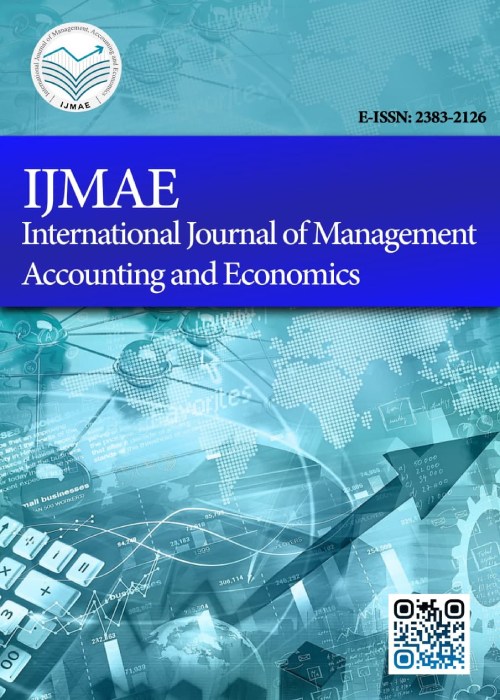فهرست مطالب

International Journal of Management, Accounting and Economics
Volume:8 Issue: 3, Mar 2021
- تاریخ انتشار: 1400/02/22
- تعداد عناوین: 4
-
Pages 122-142This study examines accounting ethics' impact on financial report quality and decision-making Kabul based logistic corporations in Afghanistan. Accounting ethics is such an important aspect of the field since accounting ethics is a matter of rules and values. Accounting ethics is mainly an area of applied ethics and is part of corporate ethics and human ethics, financial reporting consistency is a mindset, not a collection of particular activities. For making a decision, a good manager needs to be practical but confident when executing it. Unfortunately, some know-how, at the right moment, to switch from realism to optimism. There for the study examines the effect of accounting ethics on financial report quality and decision making. Totally 30 valid questionnaires, which were collected through Google Form, were analyzed by SPSS 24. To examine the suggested hypotheses, correlation analysis, and linear regression analysis were employed. For examining the reliability of adopted scales, Cronbach's Alpha was used. The study results demonstrated that accounting ethics significantly positively impact financial report quality and decision-making in Kabul-based logistic corporations. This study's findings fill the gap in Afghanistan's accounting literature by empirically investigating accounting ethics' impact on financial report quality and decision-making Kabul based logistic corporations.Keywords: Accounting Ethics, Financial Report Quality, Decision Making, Afghanistan
-
Pages 143-155Todays, everyone witnesses the influence and expansion of using information technology in delivering various services. Despite the expansion of using the above-mentioned services, there are still some risks to using such services. Thus, identifying such risks and adopting the necessary strategies to them are highly beneficial. As a result, the present study aimed to identify and rank the risks in the field of electronic service with an emphasis on information and communication technology offices. Thus, the research objective was realized using the mixed research method. In the qualitative phase of the study, the library method and semi-structured interviews were used for identifying the electronic service risk pattern and in the quantitative phase, a researcher-made questionnaire was used as a data collection tool and the fuzzy TOPSIS test was used for ranking the risks identified during the first phase. The results indicated that electronic service risks are divided into four main categories such as organizational factors, operational factors, environmental factors, and technological factors. Among the identified risks, environmental factors have the highest risk, followed by operational factors, organizational factors, and technological factors. Using the results of the study, it can be expected that electronic service providers, managers, and government sectors are expected to focus their efforts on reducing the relevant risks through a proper understanding of the types of risks, considering the significance of each risk and making decisions on planning the services. The result is an increase in the quality of electronic service and customer satisfaction.Keywords: Service model, E-Service, risk, Theme analysis, Fuzzy TOPSIS
-
Pages 156-184
On an annual basis, data shows that there are numerous university and college students that fail to complete their courses and graduate with the intended degree or diploma in hand. The aim of this study is to explore the factors that influences the decision making of a student when it comes to choosing varsity courses, investigate how these factors can impact the students’ decisions and provide recommendation on how the cognitive behaviour and academic excellence can be used to make a sound decision, setting the students for success in their varsity life. This research has narrowed down to three major factors which are personal, interpersonal and environmental. The study is conducted using a Likert scale method further expanding the factors into subdivisions for the participants to rank. The population (data set) for this survey is 50 students from all walks of life but concentrated in Klang Valley. The key findings from the study shows the most prominent factor are Personal factors. The second most influential item are Environmental factors. Interpersonal factors come in third. Concluding this research, it is prudent to obtain a bigger and robust data set. A future practical application of this research can be developed by a tool which further provides a systematic solution for all its users to yield the best potential and make the best-informed decision when furthering their education.
Keywords: Varsity, interpersonal, Personal, Environmental, Cognitive Behaviour, tertiary education -
Pages 185-194The global economy has plummeted since the COVID-19 pandemic hit the world in early 2020. While the economic effect of the pandemic has been felt globally, it was grave in Sub-Saharan Africa due to the region’s fragility. This article aims to probe the economic impact of COVID-19 in Sub-Saharan Africa and while doing so, examines the effect by sector, giving specific emphasis to the most affected sectors - among these are tourism, commodity exports and trade, remittances, and financial and fiscal sectors. Moreover, the study attempts to understand how the pandemic contributed to or rather exacerbated the existing problems in the region including poverty, unemployment, and inequality. As a result of the pandemic, hard-earned economic growth has been reversed, millions have been pushed into poverty, inequality has widened, and entire sectors have collapsed or extremely crippled. Above all, the pandemic pushed Sub-Saharan Africa into the first recession in twenty-five years.Keywords: COVID-19, Sub-Saharan Africa, Pandemic, Economy, Fragility


